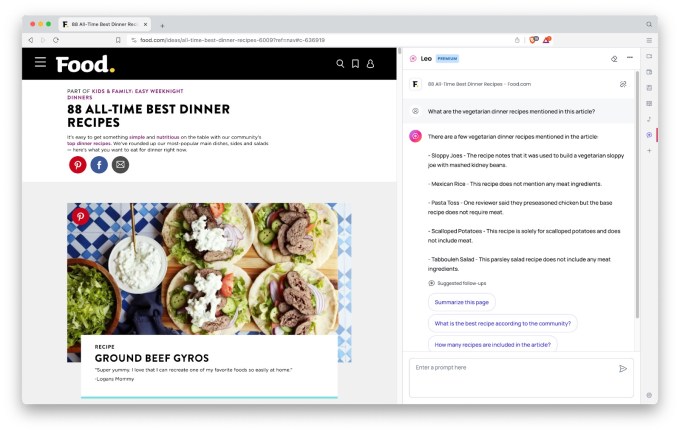[ad_1]
Brave, a company building an alternative web browser, is releasing its AI-powered assistant, Leo, to all desktop users. The company is also releasing a $15 per month paid version called Leo Premium with features like access to faster and better large language models (LLMs) and higher-rate limits.
Leo has been under testing for a few months. Brave made it available to its Nightly version users in August. Starting today, it will be available to all Brave desktop browser users with version 1.60.
Users can access the Leo assistant by clicking the Leo icon in the sidebar to start conversing or just by typing a question in the address bar and clicking the Leo icon to get a direct answer.

Image Credits: Brave
Brave’s AI-powered assistant can handle context-aware requests such as summarizing webpages or videos, translating text and rewriting phrases.
Leo is based on Llama 2 and Anthropic’s Claude LLMs. While free users get the basic version of these models, paying users will get access to models like Llama 2 70B, Code Llama 70B, and Anthropic Claude Instant. These models enable faster and more accurate responses.
Brave said that all requests to Leo use an anonymous server as a proxy, so they can’t be linked back to a particular IP. Additionally, the company specified that responses are immediately discarded after generation, and not stored on any server or used to train models. Brave noted that all subscriptions are validated by unlinkable tokens, so the company can’t know about your activity or your email.
Browser-based AI assistants and features are now becoming more common. Some browsers, including Opera and Microsoft Edge, have also introduced AI-assistant in the sidebar. Other upstarts such as SigmaOS and Browser Company’s Arc have experimented with different formats and features for AI-based features. As more browsers are adopting AI, they will have to innovate beyond summarization and rewriting features to help companies monetize.
Brave, which laid off 9% of its staff in October, is currently focusing on generating more revenue. In April, the company Search stopped using Bing’s index to start depending on its own indexing solution. In May, Brave launched its own search API for clients, with prices starting from $3 per 1,000 queries.
[ad_2]